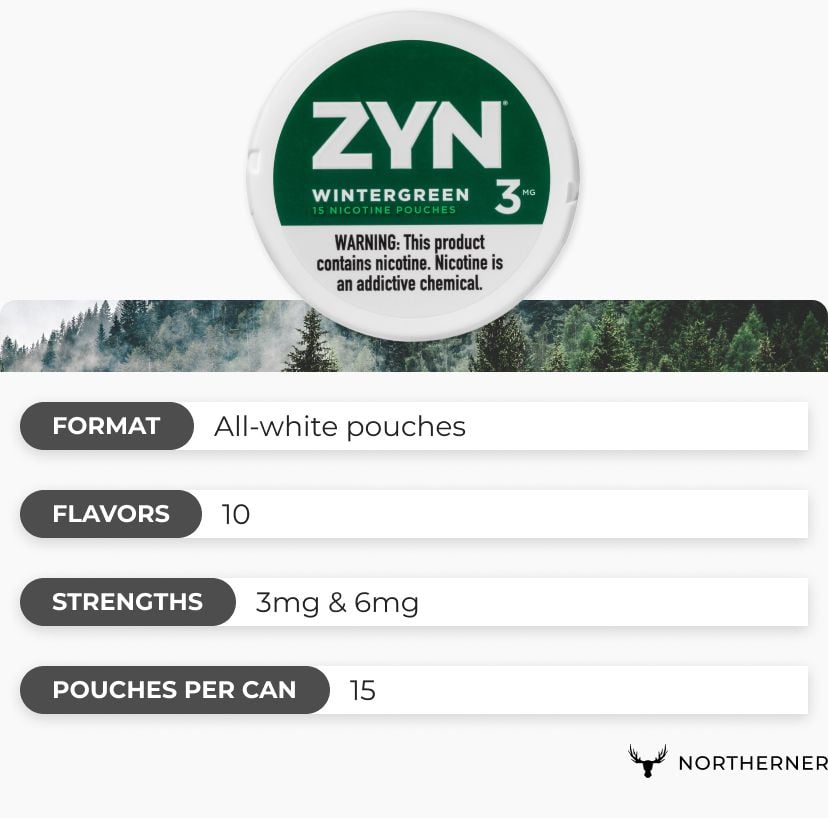ZYN Highlights
Flavor & Strength Variety
Choose from 10 ZYN flavors (including 4 assorted mints, 2 unflavored options, as well as Citrus, Coffee, Cinnamon, and Menthol) with either 3mg or 6mg of nicotine per pouch.
Tobacco Leaf-Free Nicotine
There are 15 all-white pouches in every can of ZYN, containing zero traces of tobacco. Simply place one under your upper lip and enjoy a nicotine release for up to an hour.
Child-Resistant Packaging
Not only are ZYN cans pocket-friendly and convenient to carry, they also have a twist-and-lock safety lid to reduce the risk of accidental exposure to children.
Top 3 ZYN Nicotine Pouches
Northerner customers keep coming back for more of these ZYN pouches:
ZYN Flavor & Strength Breakdown
ZYN caters for a wide range of preferences with their flavor and strength lineup. You’ll find all of their tobacco leaf-free pouches currently stocked in our Houston warehouse.
| Flavor | Available Strengths |
| Wintergreen | 3mg & 6mg |
| Cool Mint | 3mg & 6mg |
| Spearmint | 3mg & 6mg |
| Peppermint | 3mg & 6mg |
| Citrus | 3mg & 6mg |
| Coffee | 3mg & 6mg |
| Cinnamon | 3mg & 6mg |
| Chill | 3mg & 6mg |
| Smooth | 3mg & 6mg |
| Menthol | 3mg & 6mg |
ZYN 3mg is considered Less Intense and ZYN 6mg is considered Regular.
If you're having difficulty deciding which ZYN flavor to go for, why not try one of ZYN's exclusive mixpacks?
- The Mint Mixpack includes all 4 ZYN mints (Cool Mint, Peppermint, Spearmint, and Wintergreen) in 3mg or 6mg;
- The Unflavored Mixpack includes both unflavored ZYNs (Smooth and Chill) in 3mg or 6mg;
- The Bestseller Mixpack includes ZYN’s top 3 pouches (Wintergreen, Cool Mint, and Spearmint) in 3mg or 6mg;
- The Discovery Pack includes 1 can of each ZYN flavor (10 total) in 3mg or 6mg.
About ZYN
ZYN is the #1 nicotine pouch brand in the US, offering adult consumers a modern smokeless alternative to traditional combustible tobacco.
Launched in 2014 and manufactured by Swedish Match, they were later acquired by Philip Morris International in 2022. Their all-white pouches are made with plant-based fibers and designed to fit comfortably under your lip, where tobacco leaf-free nicotine salts are absorbed via the mouth lining.


Why Choose Northerner?
Northerner is your one-stop nicotine pouch shop. Here you’ll find competitive pricing on all ZYN products with bulk-buy options available in 5, 10, 25, or 50-can packs.
We're also one of two trusted and independent online retailers mentioned on ZYN's website.
We make it easy to order with our secure payment options at checkout, 21+ age-verified transactions, and the convenience of home delivery.
Shipping & Delivery Information
Your ZYN is in safe hands with one of our trusted carriers. Choose the option below that best fits your schedule:
- FedEx: 3-7 business days
- UPS: 2-5 business days (includes UPS Next Day Air for express delivery)
- USPS: 3-7 business days
Please be aware that you must be at least 21 years old to order anything from our site.
FAQ
To open a can of ZYN, twist the lid until the arrows line up (you’ll find these on the top and bottom of the can). Lift the lid, grab a fresh pouch, and park it under your upper lip against your gum. Let the pouch release nicotine for up to an hour. When you’re ready, remove the pouch and throw it in the nearest trash can. Remember to twist the lid of the can when closing it, so the arrows no longer align, to keep the pouches secure and prevent accidental exposure to children.
- There are 15 all-white nicotine pouches inside every can of ZYN.
You’ll find ZYN available in 10 flavored and unflavored varieties including: Wintergreen, Cool Mint, Spearmint, Peppermint, Menthol, Citrus, Coffee, Cinnamon, Smooth, and Chill. All flavors are available in either 3mg or 6mg strengths.
ZYN nicotine pouches contain pharmaceutical-grade nicotine (nicotine bitartrate dihydrate), stabilizers (hydroxypropyl cellulose), fillers (micro crystalline cellulose, maltitol, gum arabic), pH adjusters (sodium carbonate, sodium bicarbonate), and artificial sweeteners (acesulfame K). A pouch weighs approximately 0.4 grams and has less than 1 calorie. ZYNs are also considered lactose-free and gluten-free (based on the FDA’s established limit of containing less than 20 parts per million of gluten). For more information, consult the back of the can.
Like all nicotine products, you must be at least 21 years old to purchase ZYN. All Northerner orders are subject to age verification with online ID checks and an extra Adult Signature Requirement in some states.
Absolutely. If you’ve already got a ZYN Rewards account, simply scan the QR code on the back of each can and enter the unique code to add to your points balance. Eventually you can use these points to redeem prizes in their store. Keep in mind, the codes are case-sensitive and you can enter a maximum of 60 codes per month. Ordering your ZYN through us also entitles you to Northerner loyalty points.




